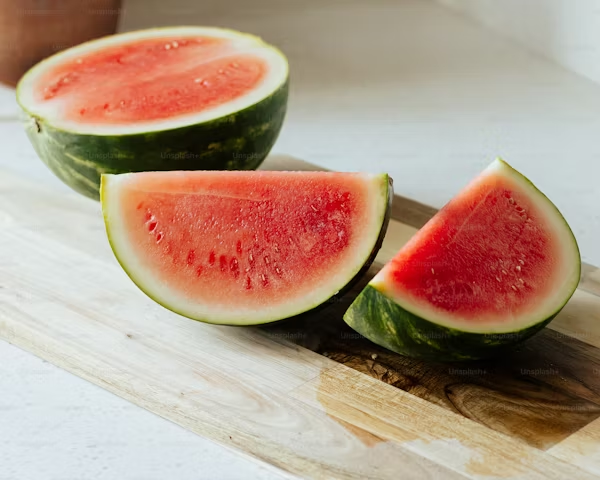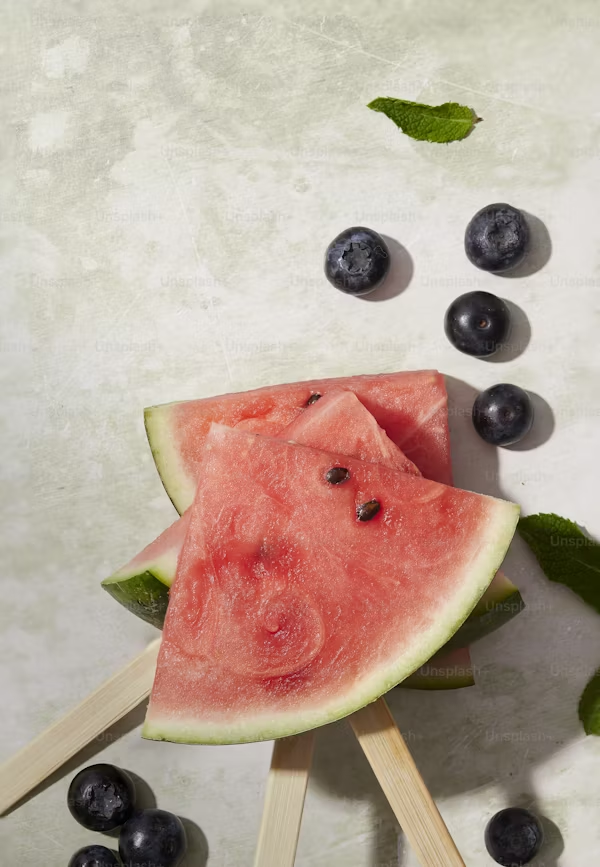While there is no specific Hadith in which the Prophet Muhammad (peace be upon him) mentions watermelon directly, the principles of Tibb-e-Nabawi (Prophetic Medicine) focus on foods and practices that promote balance, health, and well-being, which align with the properties of watermelon. In the general context of Prophetic teachings, the consumption of natural, wholesome foods that benefit the body and maintain health is highly emphasized, and watermelon fits into this tradition due to its hydrating, cooling, and digestive properties.
1. Cooling and Hydration (Natural Remedy for Hot Weather)
Watermelon, as a fruit with a high water content (about 92%), is naturally hydrating and cooling. This aligns with the Prophet Muhammad’s (peace be upon him) recommendation to consume foods that help manage the body’s internal balance, particularly in hot weather. The Prophet (peace be upon him) was known to encourage his followers to stay hydrated, especially in the desert climate of Arabia, where the heat was intense. Although watermelon itself is not directly mentioned, it fits the description of cooling foods that were valued in his time.
For example, it is reported that the Prophet (peace be upon him) recommended drinking water in small sips during hot weather to stay hydrated without overwhelming the body, and consuming fruits that are naturally cooling like watermelon can similarly help maintain the body’s equilibrium. One famous Hadith mentions:
“The best drink after water is honey, and the best fruit is the date, but water is a gift.” (Tirmidhi)
Although dates and honey are more frequently mentioned in prophetic medicine, the principle of consuming hydrating and cooling foods like watermelon follows this guideline.
2. Digestive Benefits and Health
The Prophet Muhammad (peace be upon him) frequently emphasized the importance of digestion and maintaining a healthy stomach. He is reported to have said:
“The stomach is the home of disease, and abstinence is the most important remedy.” (Ibn Majah)
Watermelon, being rich in water and fiber, aids in digestion and promotes smooth bowel movements, which aligns with the Islamic view of maintaining a healthy digestive system. In Tibb-e-Nabawi, the Prophet encouraged foods that help prevent constipation and improve the efficiency of digestion, and watermelon’s natural properties can help support this goal by promoting regularity and cleansing the digestive tract.
3. Detoxification and Purification
The Prophet Muhammad (peace be upon him) emphasized the importance of purification in both spiritual and physical terms. Consuming foods that help the body detoxify and expel toxins was part of this holistic approach to health. The high water content in watermelon helps flush out toxins from the kidneys and urinary system, supporting the body’s natural detoxification processes. This aligns with the Prophetic practice of using foods and drinks that purify the body, such as honey, olive oil, and dates. The Prophet said:
“Purify your bodies with water, and do not harm yourselves with poison.” (Ibn Qudama)
Watermelon, with its hydrating and detoxifying properties, can be seen as a way to support the body’s natural cleansing mechanisms.
4. Cooling Internal Heat (Alleviating Fever)
In Tibb-e-Nabawi, the concept of balance in the body is central, and the Prophet (peace be upon him) often advised remedies to alleviate excess internal heat, particularly during illness. Watermelon’s cooling properties make it beneficial for reducing fever and internal body heat, which is in line with the Prophet’s guidance on consuming foods that reduce bodily discomfort. During times of illness or fever, it is known in the prophetic tradition that cooling foods and drinks, such as watermelon, can provide relief by lowering body temperature. The Prophet Muhammad (peace be upon him) is known to have used cooling remedies to bring comfort, and watermelon’s high water content serves this purpose.
5. Promotion of Overall Health and Wellness
Watermelon, rich in vitamins A, B6, C, and antioxidants like lycopene, is beneficial for maintaining overall health. The Prophet Muhammad (peace be upon him) encouraged maintaining good health and advised his followers to eat foods that nourish and strengthen the body. For example, the Prophet said:
“There are two blessings which many people lose: health and free time.” (Sahih al-Bukhari)
By promoting hydration, supporting heart health (through lycopene), and offering a range of nutrients, watermelon fits within the Prophetic principle of consuming foods that benefit the body in multiple ways.
6. Spiritual and Holistic Health
In Tibb-e-Nabawi, health is viewed as a balance between physical, mental, and spiritual well-being. While there are no direct references to watermelon in the Hadith, consuming natural, wholesome foods like watermelon that nourish the body and provide energy for physical activity is consistent with the Prophet’s (peace be upon him) approach to health. He recommended a balanced, simple diet to maintain both physical and spiritual strength, as well as engaging in moderation in all things, including diet.
Conclusion
Though watermelon is not explicitly mentioned in the Hadith, its attributes align with the principles of Tibb-e-Nabawi. As a cooling, hydrating, and digestive-supporting fruit, watermelon embodies the Prophet Muhammad’s (peace be upon him) teachings on maintaining balance, hydration, and overall health through natural foods. Whether consumed to refresh the body in hot weather, support digestion, or aid in detoxification, watermelon fits well into the holistic approach of Tibb-e-Nabawi, which encourages moderation, balance, and using Allah’s gifts to preserve and enhance health.





